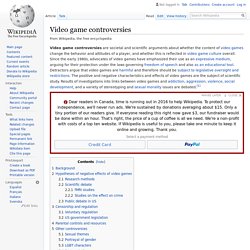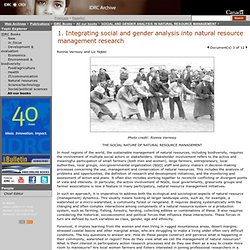

B o r d e r l a n d s e-journal home page. Endless Beginnings. Video game controversy. Video game controversies are societal and scientific arguments about whether the content of video games change the behavior and attitudes of a player, and whether this is reflected in video game culture overall.

Since the early 1980s, advocates of video games have emphasized their use as an expressive medium, arguing for their protection under the laws governing freedom of speech and also as an educational tool. Detractors argue that video games are harmful and therefore should be subject to legislative oversight and restrictions. The positive and negative characteristics and effects of video games are the subject of scientific study. Results of investigations into links between video games and addiction, aggression, violence, social development, and a variety of stereotyping and sexual morality issues are debated.[1] Maybe later |Close Thank you! Dear readers in Canada, time is running out in 2016 to help Wikipedia.
Background[edit] Hypotheses of negative effects of video games[edit] Neuropolitics.org. Matière Esprit Science, site dédié à André Bouguenec. To craft a better world, craft a better self. Emergent Meccano. A Blow Against an Icon of Capitalism. The Critical Path by Derek Huether. Top Stories. FOUDRE. Free Downloads, Practice Exams, ITIL, Minecraft. Fatal Facts - Home. We need YOUR help in finding appropriate content. SUPORT is a FREE learning resource helping small businesses to understand and access University expertise, and helping University research staff to access and understand small businesses.

The SUPORT Project is moving into the creation of it's e-Learning deliverable. In an open spirit we are inviting you to participate in sharing with us the best content you have come across on the Web. In the next weeks we want to test this "crowd-sourcing" approach to gathering content. We are looking for links to open content available via the Web (text, videos, pod-casts, infographics, etc.) that answer the following questions for small and medium businesses (SMEs) and higher education institutions (HEI) regarding the key topics we've identified: WHAT is it? Thank you ... we look forward to your links!
Welcome to SUPORT SME University Partnership Online Resource & Training. "Let The Hacking Begin" Declares Person Who Hacked Zuckerberg's Facebook Fan Page. "let the hacking begin: if facebook needs money, instead of going to the banks, why doesn’t facebook let its users invest in facebook in a social way? " Essential Questions. 0010380901004.png (Image PNG, 3024x2836 pixels) - Redimensionnée (27%) Blogging about systemic and sustainable solutions to current issues. My Strange Mind - Independent perspective on government, economics, alternative historical views, wellness and philosophy. 1. Integrating social and gender analysis into natural resource management research: International Development Research Centre. Photo credit: Ronnie Vernooy In most regions of the world, the sustainable management of natural resources, including biodiversity, requires the involvement of multiple social actors or stakeholders.

Stakeholder involvement refers to the active and meaningful participation of small farmers (both men and women), large farmers, entrepreneurs, local authorities, local groups, non-governmental organization (NGO) staff and policy makers in decision-making processes concerning the use, management and conservation of natural resources. This includes the analysis of problems and opportunities, the definition of research and development initiatives, and the monitoring and assessment of action and plans. It often also includes working together to reconcile conflicting or divergent points of view and interests. In particular, the active involvement of NGOs, local governments, grassroots groups and farmer associations is now a feature in many participatory, natural resource management initiatives.